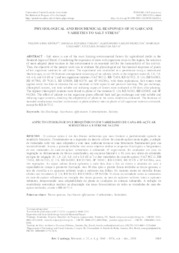Physiological and biochemical responses of sugarcane varieties to salt stress.
Physiological and biochemical responses of sugarcane varieties to salt stress.
Autoria: SIMOES, W. L.; COELHO, D. S.; MESQUITA, A. C.; CALGARO, M.; SILVA, J. S.
Resumo: Salt stress is one of the most limiting environmental factors for agricultural yields in the Semiarid region of Brazil. Considering the expansion of areas with sugarcane crops in this region, the selection of more adapted plant varieties to this environment is an essential tool for the sustainability of this activity. Thus, the objective of the present work was to evaluate the physiological and biochemical responses of plants of ten sugarcane varieties to salt stress. The experiment was conducted in a greenhouse using a randomized block design, in a 6×10 factorial arrangement consisting of six salinity levels in the irrigation water (0, 1.0, 2.0, 4.0, 6.0, and 8.0 dS m-1) and ten sugarcane varieties (VAT 90212, RB 72454, RB 867515, Q 124, RB 961003, RB 957508, SP 791011, RB 835089, RB 92579, and SP 943206), with three replications. Salt waters were applied every two days to increase the soil moisture to field capacity and promote leaching. The gas exchange, chlorophyll content, and total soluble and reducing sugars of leaves were evaluated at 90 days after planting. The highest chlorophyll contents were found in plants of the varieties Q 124, RB 96103, RB 835089, and SP 943206. The effect of salinity on the sugarcane plants affected their leaf gas exchanges and total soluble and reducing sugar contents, denoting the adaptability of plants to the stress conditions evaluated. The decrease of stomatal conductance resulted in decreases in photosynthetic rates in plants of all sugarcane varieties evaluated, except for RB 867515
Ano de publicação: 2019
Tipo de publicação: Artigo de periódico
Unidade: Embrapa Semiárido
Palavras-chave: Cana de Açúcar, Carboidrato, Estresse salino, Saccharum Officinarum, Salinidade, Sugarcane, Trocas gasosas
Observações
1 - Por padrão são exibidas publicações dos últimos 20 anos. Para encontrar publicações mais antigas, configure o filtro ano de publicação, colocando o ano a partir do qual você deseja encontrar publicações. O filtro está na coluna da esquerda na busca acima.
2 - Para ler algumas publicações da Embrapa (apenas as que estão em formato ePub), é necessário ter, no celular ou computador, um desses softwares gratuitos. Sistemas Android: Google Play Livros; IOS: iBooks; Windows e Linux: software Calibre.
Acesse outras publicações
Acesse a Base de Dados da Pesquisa Agropecuária (BDPA) para consultar o acervo completo das bibliotecas da Embrapa.

